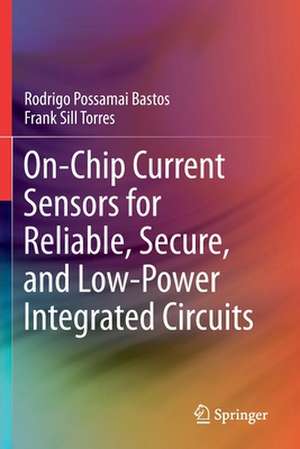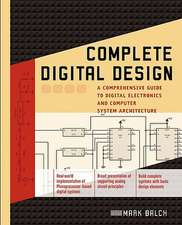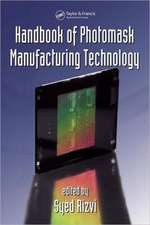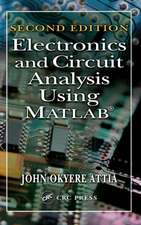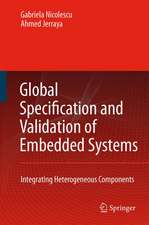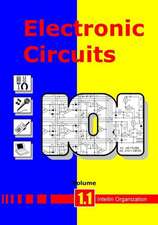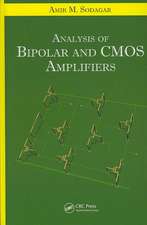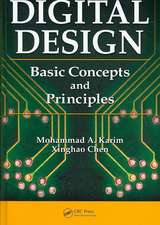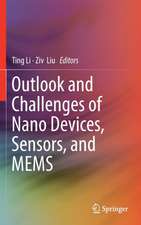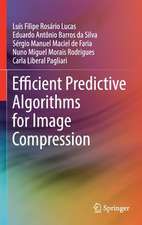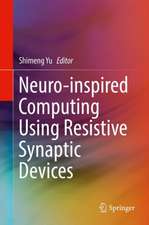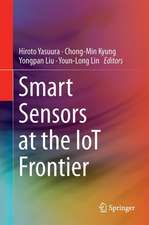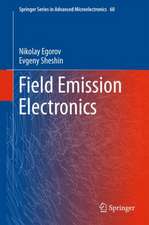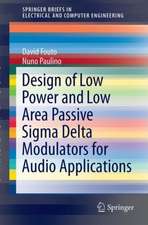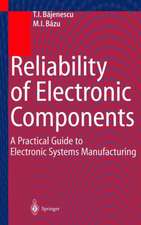On-Chip Current Sensors for Reliable, Secure, and Low-Power Integrated Circuits
Autor Rodrigo Possamai Bastos, Frank Sill Torresen Limba Engleză Paperback – 12 oct 2020
| Toate formatele și edițiile | Preț | Express |
|---|---|---|
| Paperback (1) | 448.76 lei 6-8 săpt. | |
| Springer International Publishing – 12 oct 2020 | 448.76 lei 6-8 săpt. | |
| Hardback (1) | 528.80 lei 6-8 săpt. | |
| Springer International Publishing – 11 oct 2019 | 528.80 lei 6-8 săpt. |
Preț: 448.76 lei
Nou
Puncte Express: 673
Preț estimativ în valută:
85.88€ • 88.72$ • 71.47£
85.88€ • 88.72$ • 71.47£
Carte tipărită la comandă
Livrare economică 25 martie-08 aprilie
Preluare comenzi: 021 569.72.76
Specificații
ISBN-13: 9783030293550
ISBN-10: 3030293556
Pagini: 162
Ilustrații: XXXII, 162 p. 80 illus., 50 illus. in color.
Dimensiuni: 155 x 235 x 15 mm
Greutate: 0.28 kg
Ediția:1st ed. 2020
Editura: Springer International Publishing
Colecția Springer
Locul publicării:Cham, Switzerland
ISBN-10: 3030293556
Pagini: 162
Ilustrații: XXXII, 162 p. 80 illus., 50 illus. in color.
Dimensiuni: 155 x 235 x 15 mm
Greutate: 0.28 kg
Ediția:1st ed. 2020
Editura: Springer International Publishing
Colecția Springer
Locul publicării:Cham, Switzerland
Cuprins
Chapter 1. Effects of transient faults in integrated circuits.- Chapter 2. Effectiveness of hardware-level techniques in detecting transient faults.- Chapter 3. Architectures of body built-in current sensors for detection of transient faults.- Chapter 4. Enhancing the design of body built-in sensor architectures.- Chapter 5. Noise robustness of body built-in sensors.- Chapter 6. Body built-in cells for detecting transient faults and adaptively biasing subcircuits.- Chapter 7. Automatic integration of body built-in sensors into digital design flows.- Chapter 8. Body built-in sensors for testing integrated circuit systems for hardware Trojans.
Notă biografică
Rodrigo Possamai Bastos holds an engineer's degree (Electrical Engineering in 2002) and M.S. degree (Computer Science in 2006), both from Federal University of Rio Grande do Sul (UFRGS) in Porto Alegre (Brazil). He worked as a R&D engineer at DataCom Telemática in Brazil (2002 to 2004), and he completed his double Ph.D. in Nano and Microelectronics in July 2010 at UFRGS, Grenoble Institute of Technology, and TIMA Laboratory (France). From September 2010 until August 2012, he was a postdoctoral research fellow at LIRMM (France). Since September 2012, Rodrigo is an Associate Professor at Univ. Grenoble Alpes and TIMA Laboratory. In January 2018 he has obtained the French habilitation for leading research (HDR thesis).
His research interests include integrated circuit aspects related to reliability, security, and test. Rodrigo is author/co-author over 50 papers in international scientific conferences and journals, and he is a program committee member of the internationalIEEE conferences SBCCI, LATS, LASCAS, and ICCDCS. Rodrigo is recurrent reviewer of Elsevier Microelectronics Reliability Journal, Elsevier Microprocessors and Microsystems Journal, and IEEE Transactions on Device and Materials Reliability.
Frank Sill Torres received the Diploma and Dr.-Ing. degrees in Electrical Engineering from the University of Rostock, Germany, in 2002 and 2007, respectively. He was with the Laboratory for Optronics and Microtechnologies, Federal University of Minas Gerais (UFMG), Brazil, from 2007 to 2008, which was followed by a year in the industry. From 2010 to 2018, he was as Professor with the Department of Electronic Engineering at the UFMG where he coordinated the ASIC Reliability Group. Since 2012, he is a permanent member of the Post-graduation program in Electrical Engineering of the UFMG. In 2017, he was with the Group for Computer Architecture, Institute of Computer Science, University of Bremen, Germany. In 2018, he joined the Cyber-Physical Systems group of the German Research Center for Artificial Intelligence (DFKI) in Bremen as Senior Researcher.
His research interests include Design for Reliability, Emerging Technologies and Low-Power Integrated Circuit Design, and he is author of more than 90 publications in scientific journals, congresses and workshops. Frank Sill Torres was a member of several conference committees including ISCAS, SBCCI, LATS, MWSCAS, and the program chair of the SBCCI 2016. He is an Associate Researcher of the Brazilian National Research Council (CNPq).
His research interests include integrated circuit aspects related to reliability, security, and test. Rodrigo is author/co-author over 50 papers in international scientific conferences and journals, and he is a program committee member of the internationalIEEE conferences SBCCI, LATS, LASCAS, and ICCDCS. Rodrigo is recurrent reviewer of Elsevier Microelectronics Reliability Journal, Elsevier Microprocessors and Microsystems Journal, and IEEE Transactions on Device and Materials Reliability.
Frank Sill Torres received the Diploma and Dr.-Ing. degrees in Electrical Engineering from the University of Rostock, Germany, in 2002 and 2007, respectively. He was with the Laboratory for Optronics and Microtechnologies, Federal University of Minas Gerais (UFMG), Brazil, from 2007 to 2008, which was followed by a year in the industry. From 2010 to 2018, he was as Professor with the Department of Electronic Engineering at the UFMG where he coordinated the ASIC Reliability Group. Since 2012, he is a permanent member of the Post-graduation program in Electrical Engineering of the UFMG. In 2017, he was with the Group for Computer Architecture, Institute of Computer Science, University of Bremen, Germany. In 2018, he joined the Cyber-Physical Systems group of the German Research Center for Artificial Intelligence (DFKI) in Bremen as Senior Researcher.
His research interests include Design for Reliability, Emerging Technologies and Low-Power Integrated Circuit Design, and he is author of more than 90 publications in scientific journals, congresses and workshops. Frank Sill Torres was a member of several conference committees including ISCAS, SBCCI, LATS, MWSCAS, and the program chair of the SBCCI 2016. He is an Associate Researcher of the Brazilian National Research Council (CNPq).
Textul de pe ultima copertă
This book provides readers with insight into an alternative approach for enhancing the reliability, security, and low power features of integrated circuit designs, related to transient faults, hardware Trojans, and power consumption. The authors explain how the addition of integrated sensors enables the detection of ionizing particles and how this information can be processed at a high layer. The discussion also includes a variety of applications, such as the detection of hardware Trojans and fault attacks, and how sensors can operate to provide different body bias levels and reduce power costs. Readers can benefit from these sensors-based approaches through designs with fast response time, non-intrusive integration on gate-level and reasonable design costs.
- Presents a unique approach for detection of radiation-induced transient faults in integrated circuits;
- Describes the effects of ionizing particles in the transistor body and discusses its exploitation;
- Includes innovative presentation of the multiple roles of body built-in sensors for reliability, security, and low-power applications.
Caracteristici
Presents a unique approach for detection of radiation-induced transient faults in integrated circuits Describes the effects of ionizing particles in the transistor body and discusses its exploitation Includes innovative presentation of the multiple roles of body built-in sensors for reliability, security, and low-power applications
